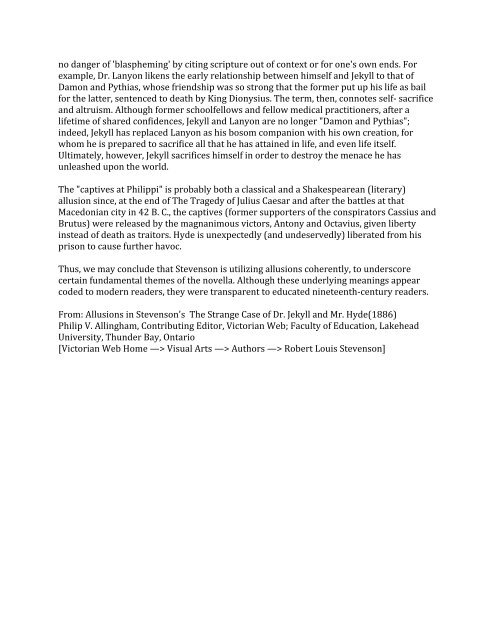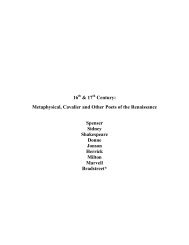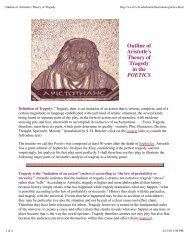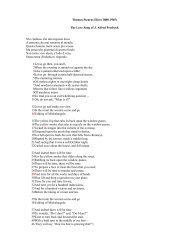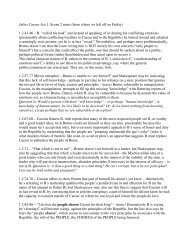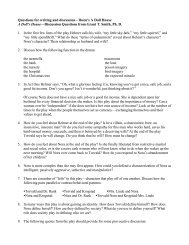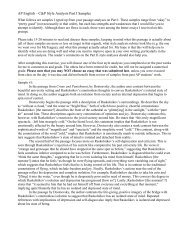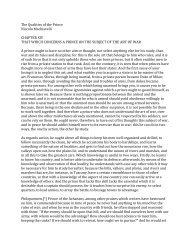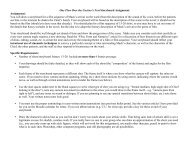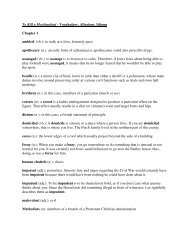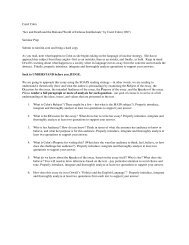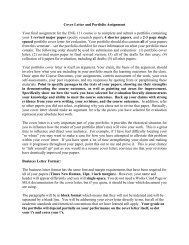An ALLUSION in a literary text is a reference, either explicit or ...
An ALLUSION in a literary text is a reference, either explicit or ...
An ALLUSION in a literary text is a reference, either explicit or ...
You also want an ePaper? Increase the reach of your titles
YUMPU automatically turns print PDFs into web optimized ePapers that Google loves.
no danger of 'blasphem<strong>in</strong>g' by cit<strong>in</strong>g scripture out of con<strong>text</strong> <strong>or</strong> f<strong>or</strong> one's own ends. F<strong>or</strong><br />
example, Dr. Lanyon likens the early relationship between himself and Jekyll to that of<br />
Damon and Pythias, whose friendship was so strong that the f<strong>or</strong>mer put up h<strong>is</strong> life as bail<br />
f<strong>or</strong> the latter, sentenced to death by K<strong>in</strong>g Dionysius. The term, then, connotes self‐ sacrifice<br />
and altru<strong>is</strong>m. Although f<strong>or</strong>mer schoolfellows and fellow medical practitioners, after a<br />
lifetime of shared confidences, Jekyll and Lanyon are no longer "Damon and Pythias";<br />
<strong>in</strong>deed, Jekyll has replaced Lanyon as h<strong>is</strong> bosom companion with h<strong>is</strong> own creation, f<strong>or</strong><br />
whom he <strong>is</strong> prepared to sacrifice all that he has atta<strong>in</strong>ed <strong>in</strong> life, and even life itself.<br />
Ultimately, however, Jekyll sacrifices himself <strong>in</strong> <strong>or</strong>der to destroy the menace he has<br />
unleashed upon the w<strong>or</strong>ld.<br />
The "captives at Philippi" <strong>is</strong> probably both a classical and a Shakespearean (<strong>literary</strong>)<br />
allusion s<strong>in</strong>ce, at the end of The Tragedy of Julius Caesar and after the battles at that<br />
Macedonian city <strong>in</strong> 42 B. C., the captives (f<strong>or</strong>mer supp<strong>or</strong>ters of the conspirat<strong>or</strong>s Cassius and<br />
Brutus) were released by the magnanimous vict<strong>or</strong>s, <strong>An</strong>tony and Octavius, given liberty<br />
<strong>in</strong>stead of death as trait<strong>or</strong>s. Hyde <strong>is</strong> unexpectedly (and undeservedly) liberated from h<strong>is</strong><br />
pr<strong>is</strong>on to cause further havoc.<br />
Thus, we may conclude that Stevenson <strong>is</strong> utiliz<strong>in</strong>g allusions coherently, to undersc<strong>or</strong>e<br />
certa<strong>in</strong> fundamental themes of the novella. Although these underly<strong>in</strong>g mean<strong>in</strong>gs appear<br />
coded to modern readers, they were transparent to educated n<strong>in</strong>eteenth‐century readers.<br />
From: Allusions <strong>in</strong> Stevenson's The Strange Case of Dr. Jekyll and Mr. Hyde(1886)<br />
Philip V. All<strong>in</strong>gham, Contribut<strong>in</strong>g Edit<strong>or</strong>, Vict<strong>or</strong>ian Web; Faculty of Education, Lakehead<br />
University, Thunder Bay, Ontario<br />
[Vict<strong>or</strong>ian Web Home —> V<strong>is</strong>ual Arts —> Auth<strong>or</strong>s —> Robert Lou<strong>is</strong> Stevenson]


